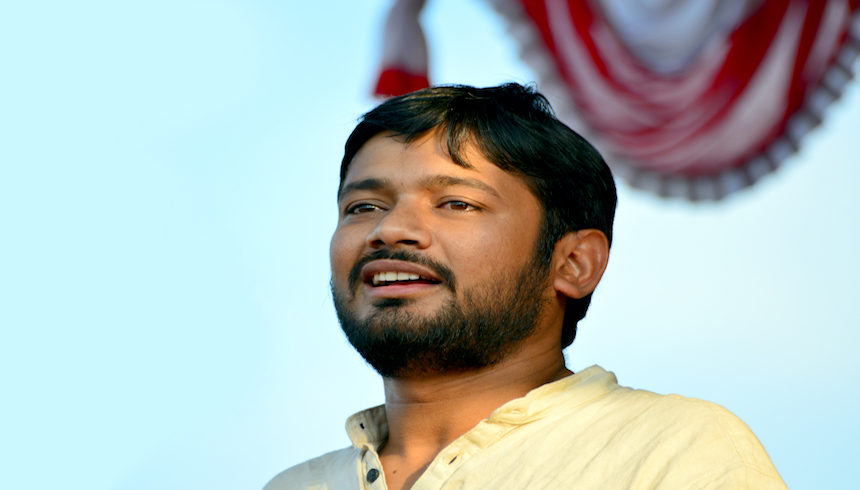The JNU Episode:
The JNU episode has estranged the people of this country like never before. Four students of Jawaharlal Nehru University who were ex members of Democratic Students Union (DSU) had sought permission to hold a cultural event. Subsequently, there were posters hung in the campus condemning the judicial killing of Afzal Guru and Maqbool Bhat and expressing solidarity with the Kashmiri’s right to self -determination.
On seeing this, the Students’ Union wrote to the Vice-chancellor asking him to withdraw his permission. The vice-chancellor immediately held a meeting with the Registrar, Students’ Union, and others following which Chief Security Officer was asked to inform the students that the permission had been withdrawn minutes before the event was about to start.
Other leftist student organisations like Jawaharlal Nehru Students Union (JNSU), Students Federation of India (SFI) were asked for help by the DSU in order to hold their protest peacefully. By now, the crowd had expanded with students of different organizations and individual students including some Kashmiri students who were not part of JNU also present there. However, ABVP students tried to impede the protest by sloganeering, which was retorted by slogans from the other group and soon it all took an ugly shape.
In fact an entire account of what exactly happened was posted on Quora by a student of JNU, Harshit Agarwal, which was shared by thousands of people including Shashi Tharoor. The answer can be found HERE.
According to him the slogan ‘Bharat Ki Barbadi Tak Jang Rahegi’ was shouted by a group of independent Kashmiri students who were expressing their anger against AFSPA and that none of those students who shouted this slogan belonged to JNU. He also has inserted an excerpt of a Kashmiri’s interpretation of what this slogan means in Kashmir. Unfortunately, what the Kashmiri explains about the slogan is a simulation of what the Kashmiris collectively feel about the Indian Military Establishment there.
A lot has already been said on the entire JNU episode, I am only going to break it down on the basis of the existing laws in place.
The Issues that JNU Episode brought forth:
- KASHMIR’S RIGHT TO SELF DETERMINATION:
It all starts with U.N. Commission obtaining a peace plan from both India and Pakistan on 5th January, 1949 where India agreed to a Commission resolution stating:
‘The question of the accession of the State of Jammu and Kashmir to India or Pakistan will be decided through the democratic method of a free and impartial plebiscite.’
However, the government’s stand changed later and since then, there has always been a debate as to whether Kashmiris have a right to self-determination. While, I do not know if secession is the answer to the Kashmir dispute, what I do know is that people of Kashmir have been victims of human rights violations, the alleged mass rape at Kunan Poshpora being one of most unsightly ones, the insurgency targeted towards Kashmiri Pundits, the special powers given to Indian military under AFSPA etc. These are instances that every Kashmiri wants to raise voice against and have been in fact doing so in their own ways.
2) AFZAL GURU’S JUDICIAL KILLING:
The other issue that the protest was addressing was Afzal Guru’s judicial killing. The debate of whether India was right in giving capital punishment to Afzal Guru has been brought up time and again by many people as his guilt was proved on the basis of circumstantial evidence and there was no concrete evidence against him.
The relevant extracts of the judgement are as follows:
“Mostly, the conspiracies are proved by the circumstantial evidence, as the conspiracy is seldom an open affair. Usually both the existence of the conspiracy and its objects have to be inferred from the circumstances and the conduct of the accused. The well known rule governing circumstantial evidence is that each and every incriminating circumstance must be clearly established by reliable evidence and “the circumstances proved must form a chain of events from which the only irresistible conclusion about the guilt of the accused can be safely drawn and no other hypothesis against the guilt is possible.”
‘The gravity of the crime conceived by the conspirators with the potential of causing enormous casualties and dislocating the functioning of the Government as well as disrupting normal life of the people of India is some thing which cannot be described in words. The incident, which resulted in heavy casualties, had shaken the entire nation and the collective conscience of the society will only be satisfied if the capital punishment is awarded to the offender.
The challenge to the unity, integrity and sovereignty of India by these acts of terrorists and conspirators, can only be compensated by giving the maximum punishment to the person who is proved to be the conspirator in this treacherous act. The appellant, who is a surrendered militant and who was bent upon repeating the acts of treason against the nation, is a menace to the society and his life should become extinct. Accordingly, we uphold the death sentence.”
The judgement was criticized by many including human right activists complaining that he wasn’t given a chance to defend himself and for various other reasons like giving capital punishment on the basis of just circumstantial evidence. The full text of the judgement can be found HERE,
In spite of all the dissent, I would never want to hear any slogan that has anything to do with my nation’s barbadi. However, no one knows for sure if such slogans were even raised. Moreover, to everyone’s appeasement, Zee News producer Deepak Mishra resigned stating that the video they shot had no ‘Pakistan Zindabad’ slogans and that the videos released had been tampered with.
This brings me to right to freedom of speech and expression under Article 19 of the Indian Constitution. Article 19 states among other things that all citizens have rights to freedom of speech and expression, to assemble peacefully without arms, to form associations or union.
These rights come with a set of reasonable restrictions. The restrictions are security of the State, friendly relations with foreign States, public order, decency and morality, contempt of court, defamation, incitement to an offence, and sovereignty and integrity of India.
It is said that the slogans raised were anti-national. However, whether they were raised or not has to be established first and if they were, the perpetrators of the same have to be identified. The footage in the reports is said to have been doctored and it has been sent for forensic examination. This is a separate issue altogether.
3) SEDITION CHARGES:
The other issue is that Kanhaiya Kumar, JNU Student Union President was slapped with sedition charges and arrested for no real fault of his. All the videos that have surfaced till date do not show him shouting these slogans. It is said that he wasn’t even part of the protest and had only come out to make peace between the two groups. It is absolutely incongruous to have someone put in jail on sedition charges merely because he did not stop those who apparently shouted anti-national slogans. Needless to say, the hooliganism demonstrated by the lawyers by beating up Kumar for hours together without any sign of remorse is chagrin to the name of the profession.
With regard to this, it is important to understand the intention of Section 124A of IPC, the wording is as follows:
124A. Sedition.—Whoever, by words, either spoken or written, or by signs, or by visible representation, or otherwise, brings or attempts to bring into hatred or contempt, or excites or attempts to excite disaffection towards, Government established by law in India shall be punished.
Disaffection means disloyalty and all feelings of enmity.
However, the explanation to the section adds that ‘comments expressing disapprobation of the measures of the Government or the administrative authority, without exciting or attempting to excite hatred, contempt or disaffection, do not constitute as an offence under this Section.’
Case Laws:
Section 124A was held to be ultra vires as it violated freedom of speech and expression by Hon’ble Allahbad High Court in Ram Nandan v. State of UP.
However, the Supreme Court in Kedarnath Das v. State of Bihar overruled it. The Supreme Court clearly distinguished between being disloyal to the country and merely commenting upon the measures of the Government without inciting public disorder by acts of violence. Therefore, even though the Hon’ble Supreme court upheld the constitutionality of Section 124A, it curtailed its meaning and limited its application to only acts that involve intention or tendency to create public disorder or violence or disturbance of law and order.
Yet, this law has been increasingly used time and again to unfairly send anyone who expresses any sort of dissent. The Hon’ble Supreme Court in Bilal Ahmed Kaloo v State of Andhra Pradesh very aptly observed that the Kashmiri youth who was charged for sedition did not contain any essential ingredients of the offence. The court acquitted the youth and stated that the appellant should not have been put to trial in the first place.
It further observed that ‘mechanical order convicting a citizen for offences of such serious nature like sedition and to promote enmity and hatred, etc, does harm to the cause. It is expected that graver the offence, greater should be the care taken so that the liberty of a citizen is not lightly interfered with.
However, in this case Kanhaiya Kumar was not only sent for 14 days judicial custody but was beaten up mercilessly by the lawyers at the Patiala House court premises showing dismaying breakdown of law and order situation and complete disregard to due process of law.
JNU Fiasco: Conclusion
Without commenting much on the entire episode, the entire fiasco compels me to point out that media is known as the fourth pillar of democracy as they empower people with information. Considering it’s upright responsibility towards the nation, it must abstain from carrying out media trial and needs to consciously report with irrefutable verity. Partisan reporting by media is going to be detrimental to the society, JNU episode being a tenacious indication of the same.
“You just hold your head high and keep those fists down. No matter what anybody says to you, don’t you let ’em get your goat. Try fighting with your head for a change.” – Harper Lee, To Kill a Mockingbird
Picture Courtesy: Wikimedia







